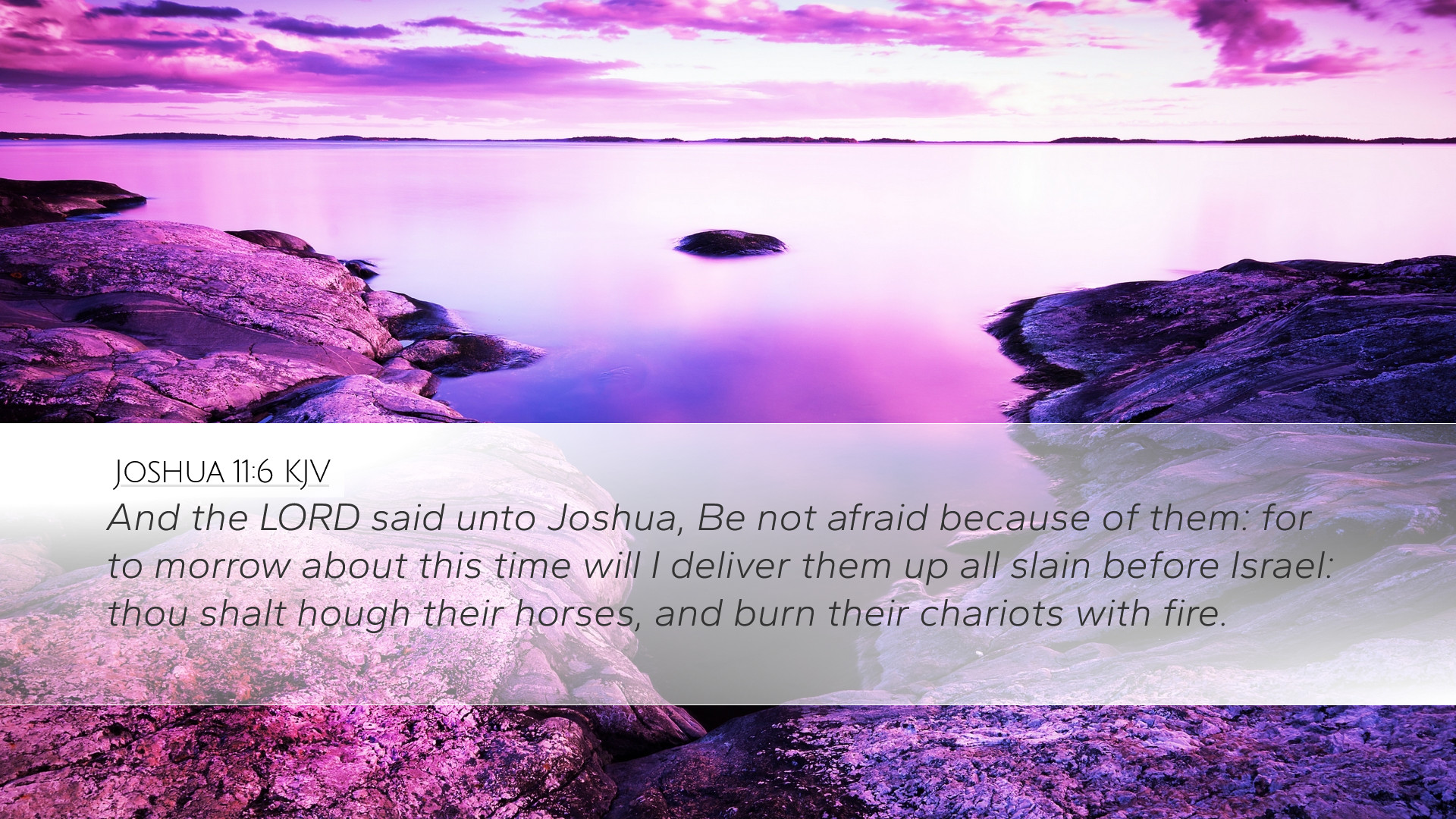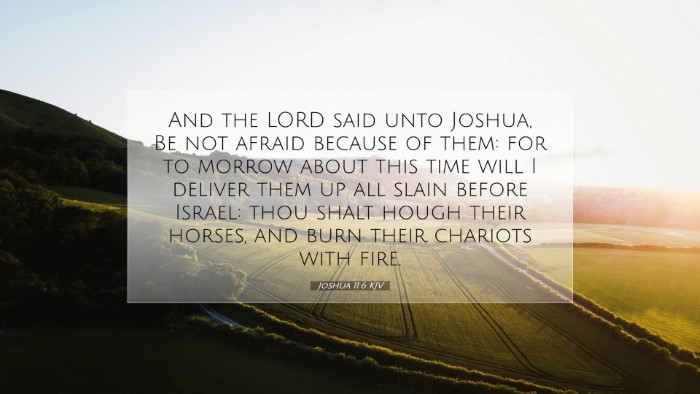Old Testament
Genesis Exodus Leviticus Numbers Deuteronomy Joshua Judges Ruth 1 Samuel 2 Samuel 1 Kings 2 Kings 1 Chronicles 2 Chronicles Ezra Nehemiah Esther Job Psalms Proverbs Ecclesiastes Song of Solomon Isaiah Jeremiah Lamentations Ezekiel Daniel Hosea Joel Amos Obadiah Jonah Micah Nahum Habakkuk Zephaniah Haggai Zechariah MalachiJoshua 11:6
Joshua 11:6 KJV
And the LORD said unto Joshua, Be not afraid because of them: for to morrow about this time will I deliver them up all slain before Israel: thou shalt hough their horses, and burn their chariots with fire.
Joshua 11:6 Bible Commentary
Commentary on Joshua 11:6
This verse provides a pivotal moment in the narrative of Israel's conquest of Canaan. The context of Joshua 11 reveals significant themes of divine guidance, the fulfillment of God's promises, and the nature of warfare in biblical theology. Here, we summarize insights from various public domain commentaries.
The Context of Joshua 11
Prior to verse 6, Joshua has been engaging in battles against a coalition of Canaanite kings. The chapter outlines how the northern kingdoms had united against Israel, portraying the desperate attempt of these nations to resist the inevitable conquest by the Israelites under God's command. Scholars emphasize the importance of these events in the broader narrative of redemption history.
Key Themes
-
Divine Assurance
God commands Joshua in verse 6 not to fear the overwhelming odds he faces, assuring him that He has delivered the enemies into his hand. This reflects the assurance that God provides to His people amidst external threats. Matthew Henry notes that such divine reassurance is a theme that echoes throughout Scripture.
-
The Role of Fear
Albert Barnes discusses the psychological implications of fear in battle. The admonition not to fear is critical; it serves as a reminder that faith in God is paramount even when circumstances appear daunting. The encouragement to resist fear not only fortified Joshua but also served as an example for future generations.
-
The Nature of Warfare
Adam Clarke emphasizes that the warfare of Joshua is not merely military but also spiritual. This points to the idea that the battles fought were in obedience to God's command and had spiritual significance. Each victory signifies not just the defeat of physical foes but also the establishment of God's kingdom on earth.
Verse Breakdown
Joshua 11:6 reads: “And the Lord said unto Joshua, Be not afraid because of them: for tomorrow about this time will I deliver them up all slain before Israel.” This can be broken down into several key components:
1. Divine Speech
The phrase “And the Lord said unto Joshua” underscores the relationship between God and His chosen leader. The word of the Lord is a powerful source of direction and comfort, illustrating a personal engagement between God and His people. The dialogues in Scripture reinforce God's active involvement in guiding His people.
2. Confronting Fear
The directive to “Be not afraid” resonates throughout Scripture as a common theme where God encourages His servants. Fear is depicted as a natural human emotion; however, it is addressed with the certainty of God's promise. This reflection aligns with Matthew Henry’s assertion that fear arises from circumstances but must yield to faith in God’s promises.
3. Assurance of Victory
“For tomorrow about this time will I deliver them up all slain” highlights God's control over time and events. The specificity of “tomorrow” signifies an imminent victory, which can instill hope in the hearts of the faithful. Albert Barnes points out that such a time-bound promise reinforces God's sovereignty and the assurance that His plans culminate in victory.
4. The Purpose of Divine Intervention
“Before Israel” denotes that the act of deliverance is meant to be witnessed by His people. The victories over their enemies serve to strengthen Israel’s faith and affirm their identity as God’s chosen people. Adam Clarke notes that the defeat of these nations was not just an act of conquest, but a demonstration of divine authority over rival gods.
Application for Today's Believers
This verse and its surrounding context serve not only as historical narrative but also as applicable lessons for contemporary believers. Reflection on Joshua 11:6 can inspire faith amidst personal battles and larger societal challenges.
Lessons on Faith and Trust
-
Embrace Divine Promises
Just as Joshua relied on God's promises, modern believers are encouraged to hold onto Scripture. God’s assurances in Christ echo the steadfastness seen in Joshua’s leadership.
-
Respond to Fear with Faith
In moments of uncertainty, the exhortation to not fear must shape our responses. Engaging with God through prayer and remembrance of His past faithfulness can bolster our convictions.
-
Recognize Spiritual Warfare
The battles faced are more than physical; they are spiritual in nature. Ephesians 6:12 reminds us that our struggle is not against flesh and blood, prompting believers to seek divine strength and wisdom in their daily lives.
-
Expect God's Deliverance
Anticipating God’s intervention can transform our perspectives on struggles. A patient expectation of God’s timing aligns with the teaching found in this verse.
Conclusion
Joshua 11:6 encapsulates a profound moment of faith, divine assurance, and the paradigm of spiritual warfare. By reflecting on the texts from Matthew Henry, Albert Barnes, and Adam Clarke, pastors, theologians, students, and scholars can glean valuable applications for faith and leadership from Joshua’s experiences. As we face our battles, may we remember to rely on God's assurances, confront our fears with faith, and recognize the spiritual dimensions of our trials.


